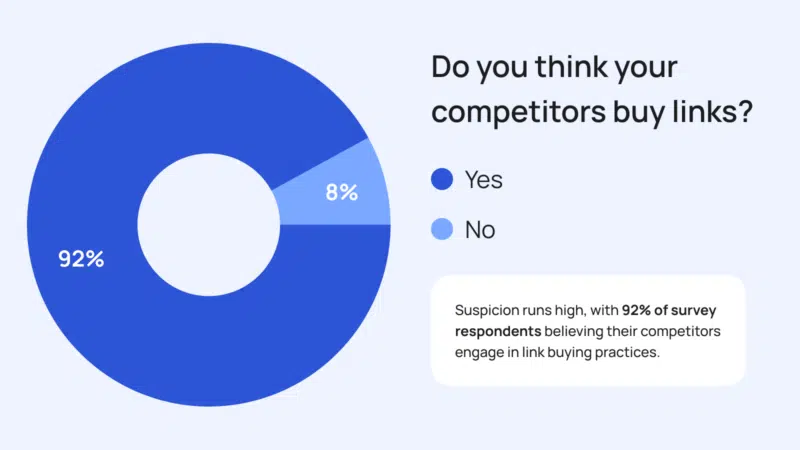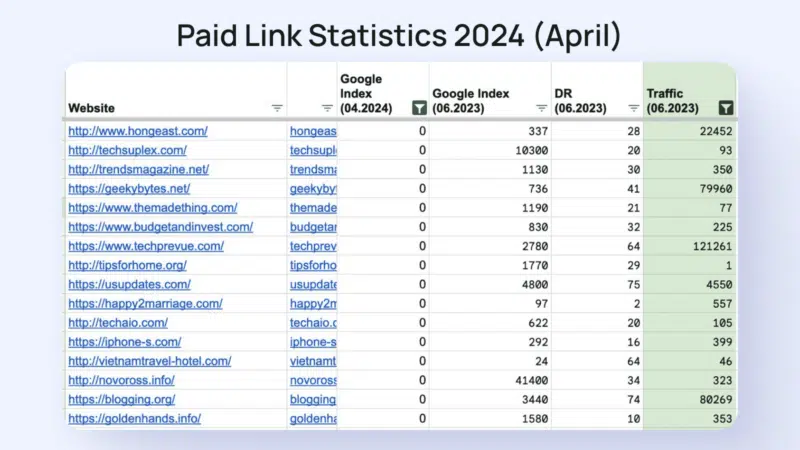When it comes to search engine optimization (SEO), link building is one of the most talked-about—and often controversial—topics. Recent survey results have revealed an eye-opening statistic: 92% of SEOs believe that their competitors are engaging in link-buying practices. This suspicion highlights ongoing concerns about ethics, tactics, and competition in the ever-evolving SEO industry. But what does this mean for your SEO strategy, and how should you navigate these murky waters? Let’s dive deeper into what these numbers reveal.
What is Link Buying?
In simple terms, link buying refers to the practice of paying for backlinks from external websites in order to boost a website’s authority and rankings in search engines. While this might sound straightforward, it’s a gray area in SEO, often skirting or outright violating Google’s Webmaster Guidelines. Backlinks are one of the key factors in Google’s ranking algorithm, but the search engine prefers that they occur naturally, rather than being artificially inflated through financial transactions.
When someone buys links, they’re essentially trying to manipulate search engine results in their favor. And while this can lead to short-term gains in visibility and rankings, it’s a risky move with potentially damaging consequences.
Why Do SEOs Suspect Competitors Buy Links?
The SEO industry is competitive, and securing those coveted top spots on search engine result pages (SERPs) can feel like a high-stakes race. For many SEOs, seeing a competitor leapfrog their position in the rankings can raise red flags, especially when there’s no clear indication of superior content or technical improvements. It’s easy to suspect foul play—namely, link buying—when it seems a rival website is gaining backlinks faster than organically feasible.
Here are some of the main reasons SEOs suspect their competitors are buying links:
- Rapid Growth of Backlinks: If a competitor suddenly acquires a significant number of backlinks in a short period, it raises suspicions. Organic link-building is a slower, more gradual process.
- Low-Quality Links: SEOs can often spot when a competitor’s site has gained links from irrelevant or low-authority domains. These types of backlinks are a telltale sign of paid link schemes.
- Inconsistent Content Quality: Competitors with mediocre content that outrank more valuable, in-depth content from others may have boosted their position through link-buying rather than organic efforts.
- Limited Brand Exposure: When a website with minimal online presence suddenly garners attention in major publications, SEOs begin to wonder if money was exchanged to secure those placements.
The Risks of Buying Links
While buying links might seem like a shortcut to success, it’s a risky game. Search engines like Google take link manipulation very seriously, and websites caught engaging in these practices can face penalties, such as:
- Manual Action Penalties: Google may manually penalize your site, causing a significant drop in rankings or deindexing it altogether.
- Loss of Trust: A site that’s penalized for link-buying will lose credibility, not just with search engines but with users and potential business partners as well.
- Wasted Investment: Paying for links can be expensive. When those links are discovered and removed, your ranking boost will disappear along with the money spent.
For companies trying to establish a long-term SEO strategy, these risks are too great to ignore. Organic growth remains the safest, most sustainable approach to building authority.
Ethical Alternatives to Link Buying
Despite the prevalence of link-buying suspicions, ethical link-building strategies still dominate the SEO landscape. Here are a few methods SEOs can use to build backlinks without resorting to questionable tactics:
- Create High-Quality Content: Great content that provides real value is naturally linkable. Write comprehensive guides, infographics, or case studies that people want to reference and share.
- Guest Blogging: Writing for other websites in your niche allows you to earn backlinks in exchange for providing valuable insights to their audience.
- Outreach and Relationship Building: Developing relationships with influencers, bloggers, and journalists in your industry can lead to natural link placements. Share your content with them and explain why it’s relevant to their audience.
- Focus on Local SEO: Earning backlinks from local directories, news outlets, and industry-specific publications can improve your site’s authority without resorting to paid links. If you’re offering SEO services in Dubai, local businesses may link to your services naturally as part of the business ecosystem.
How to Handle Competitors That Buy Links
If you suspect that your competitors are engaging in link-buying, it’s tempting to fight fire with fire. However, taking the high road can yield better long-term results. Here’s how to handle the situation:
- Improve Your Content: The best defense is a strong offense. Create content so compelling that it naturally attracts links, even from your competitors’ sources.
- Report Suspicious Links: Google offers a Disavow Tool that allows webmasters to notify them about dubious backlinks pointing to their site. Use this tool carefully if you notice that competitors have unnatural backlinks.
- Focus on Organic Growth: Don’t let short-term tactics distract you from long-term goals. Keep optimizing your website for search engines through white-hat techniques. This includes improving technical SEO, mobile-friendliness, and content relevance. If you’re offering SEO services in Karachi, make sure your local SEO is rock solid, too.
- Monitor Your Backlink Profile: Use tools like Ahrefs or Moz to keep track of who’s linking to your site and your competitors. Identifying a suspicious spike in links will help you better understand the tactics being used and how to adjust your strategy accordingly.
Final Thoughts
The survey results revealing that 92% of SEOs suspect their competitors buy links is a reflection of how competitive and sometimes cutthroat the SEO industry can be. While it may be tempting to follow suit, ethical SEO strategies that focus on content quality, user experience, and organic growth will always yield more sustainable success in the long run. Navigating SEO in an ethical manner not only helps protect your website from penalties but also builds lasting trust with your audience.



